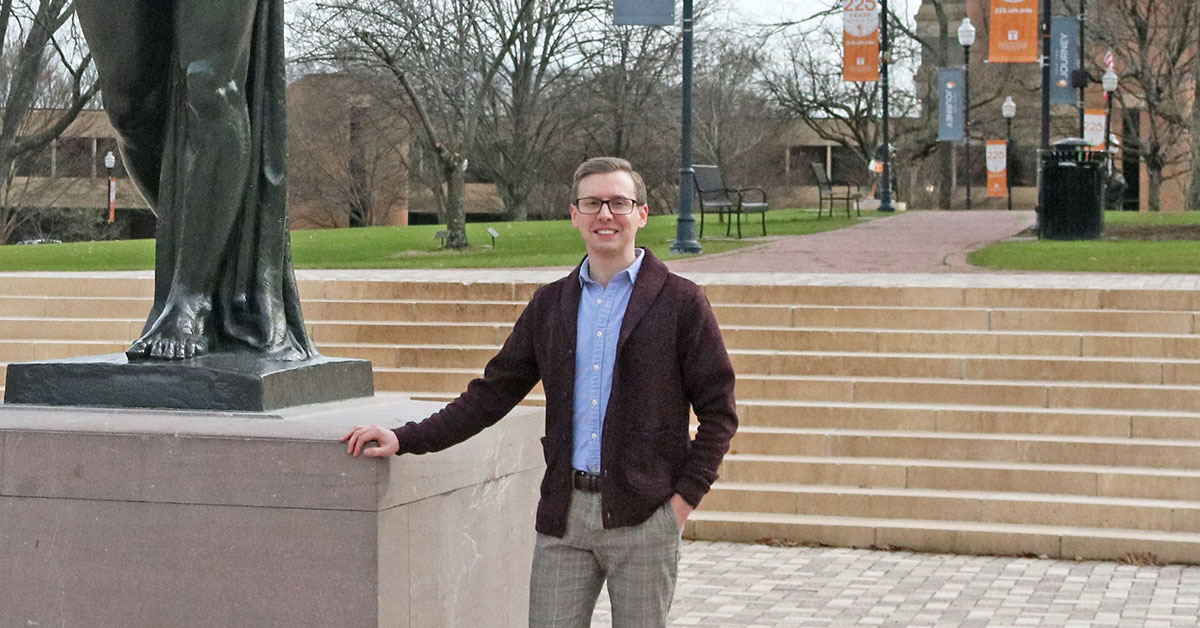Assistant Professor Brian Dobreski Receives Bonnie Carroll and Roy Cooper Faculty Enrichment Award

Assistant Professor Brian Dobreski has just wrapped up his second year at the School of Information Sciences, and despite one of those years being in a pandemic, he’s still managed to produce exceptional research that earned him the SIS 2021 Bonnie Carroll and Roy Cooper Faculty Enrichment Award.
In the last couple of years, Dobreski has continued work on a knowledge organization project to better label archival photos of sideshow performers, and he’s started new work on defining what personhood means in relation to works created by artificial intelligence.
He’s been able to publish multiple papers out of the knowledge organization project, done so with the help of students who assisted with a lot of the manual work of combing through data. Dobreski explained that many of the terms used to describe photos of the sideshow performers are now considered – and even in their time were considered – to be quite derogatory. So his goal was to, “Try not to obscure that language, but help people understand who these individuals were.” Much of the time, this included adding medical descriptions of conditions the performers had, as well as using terms that modern-day communities use to describe themselves, he said.
The next steps for this research is making an automated algorithm process to go through similar collections to look for the older language and assign the contemporary terms that Dobreski and his collaborators have set. In addition to all this work, one of his collaborators is also working to publish the datasets as linked data and make them open datasets.
The personhood project is one that looks ahead to the future and anticipates issues that are already arising with the increasing popularity of artificial intelligence programs.
“This project deals with personhood in information, who or what gets to be considered a person. So with artificial intelligence, do we consider that to be a person? If it creates something, does it have creative rights or responsibility?” he said.
For example, if someone creates an AI program and that program ends up creating a painting – who is the creator? The AI or the program creator? Dobreski already published one paper at the 2021 Libraries in the Digital Age conference on this topic, which addressed the definition of what a person is. Dobreski found 10 different definitions of what a person is just within standards in the field of information sciences. He is asking these questions because persons are afforded different rights, so it’s important to know what, or who, a person is.
“Even in our field, we have certain rights and responsibilities we associate with persons, but it’s not consistent across the field. The idea is in looking at this, we’ll better understand some of the coming issues we’ll face with artificial intelligence,” he said.
Some of those issues include audiences becoming accustomed to believing anything they see on video, but what if that video has been altered – such as is the case with “deepfake” videos that replace one person’s face with another person’s? How do audiences understand and make sense of these “persons”? Dobreski hopes his research can help highlight existing or potential issues within this realm.
He also wants to address a more traditional cataloging topic starting in the fall, which is how catalogers are using the new edition of the Resource Description and Access (RDA). Traditionally, the RDA has been presented online as a book-like interface with chapters and sections, whereas the new version’s interface is more akin to a search knowledgebase. This research builds on Dobreski’s doctoral dissertation, which was about how people read and understood the RDA in its old form.
As for the award, Dobreski said he’s honored to be recognized and appreciates the extra funding to apply towards conferences and travel that supports his research – something he’s very hopeful he’ll get to do more of this next year as the COVID-19 pandemic declines, more people are vaccinated, and travel resumes.